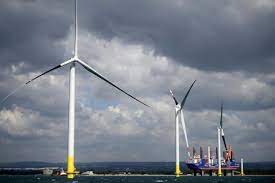By 2030, the EU has agreed to almost treble renewable energy
In an effort to become carbon neutral and move away from Russian fossil fuels, the European Union agreed Thursday to roughly increase the proportion of renewable energy in the energy consumption of the 27-nation bloc by 2030.
The temporary political agreement aims to increase the amount of renewable energy from its current 22 percent to 42.5 percent. It was agreed following a night of negotiations between the EU parliament and states.
By 2050, the EU wants to have a “climate neutral” economy with zero net emissions of greenhouse gases.
The action also comes at a time when the EU is attempting to reduce its reliance on Russian fossil fuels following Moscow’s last year’s cutoff of gas supplies and the bloc’s embargo on seaborne crude and other petroleum products from the nation.
The number is a compromise between the states’ requested 40 percent and the 45 percent share for renewables sought by EU parliamentarians and the EU’s executive body, the European Commission.
nuclear discussion
Together with solar and wind technology, the agreement lists hydrogen, nuclear power, and biomass as sources of sustainable energy.
Burning wood to make power is a form of biomass that comes from organic material like plants, trees, and urban garbage.
Scandinavian nations defend the practice, while environmental organizations are critical of it due to worries about its effects on forests.
The agreement imposes severe guidelines on the use of biomass, according to Pascal Canfin, chairman of the environment committee of the European Parliament.
The inclusion of hydrogen generated by nuclear power had been resisted by a group led by Germany out of worry that it would hinder investments in renewable energy sources.
After Sweden, which now holds the rotating EU chair, put out a compromise, a deal was ultimately agreed.
According to Canfin, the agreement allows France to use nuclear power rather than being compelled to develop renewable energy infrastructure in order to manufacture hydrogen for use in industry and transportation.
Canfin stated that France’s backing for the final accord was “an absolute must.”
AFP


